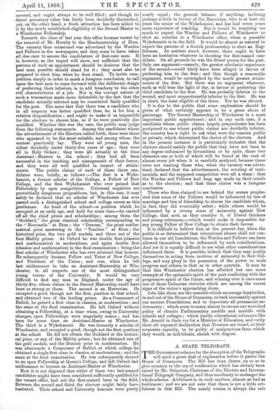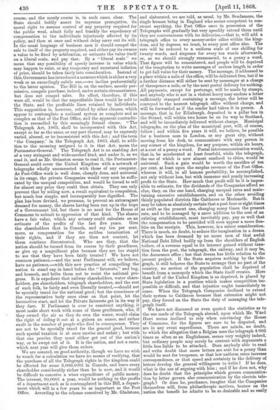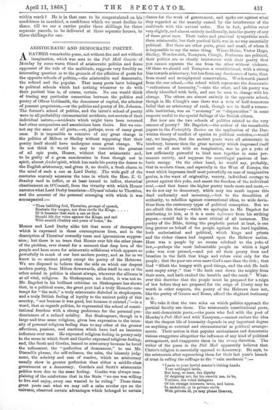A STATE TELEGRAPH.
THE Government scheme for the absorption of the Telegraphs will need a great deal of explanation before it passes the House of Commons. The Bill has been drawn up so as to give occasion to the cry of confiscation which has already been raised by Mr. Grimston, Chairman of the Electric and Interna- tional Telegraph Company, and thus needlessly to endanger the whole scheme. Artfulness is, in such matters, almost as bad as feebleness•; and we are not sure that there is not a little art- fulness in this Bill. The manly course is always the safe course, and the manly course is, in such cases, clear. The State should boldly assert its supreme prerogative, its moral right to assume control of any property required for the public weal, admit fully and frankly the expediency of compensation to the individuals injuriously affected by its policy, and then at once and without delay carry out its will. In the usual language of business men it should compel the sale to itself of the property required, and either pay its owners a value to be fixed by arbitration, or estimate the value itself on a liberal scale, and pay that. By a " liberal scale " we mean that any possibility of speedy increase in value which may happen to exist, or any temporary and unnatural inflation of price, should be taken fairly into consideration. Instead of this, Government has introduced a measure which is either a very weak or an exceedingly subtle one,—we incline preferentially to the latter opinion. The Bill is, on the surface, merely per- missive, compels purchase, indeed, under certain circumstances, but does not compel sales. Its effect, therefore, if this were all, would be that the unprofitable lines would be sold to the State, and the profitable lines retained by individuals. This supposition is, however, refuted by other clauses, which appear to contemplate a national system as complete and as complex as that of the Post Office, and the apparent contradic- tion is reconciled by this seemingly formal clause. " The Telegraph Act, 1863, shall be incorporated with this Act, except so far as the same, or any part thereof, may be expressly varied, altered, or be inconsistent with this Act ; and the term 'the Company,' in the Telegraph Act, 1863, shall, in addi- tion to the meaning assigned to it in that Act, mean the Postmaster-General." The Telegraph Act is an enabling Act of a very stringent and wide-meshed kind, and under it, as we read it, and as Mr. Grimston seems to read it, the Postmaster- General could cover the United Kingdom with a network of telegraphs wholly unconnected with those of any company. As Post-Office work is well done, cheaply done, and universal in its range, the private Companies would very soon be suffo- cated by the unequal competition, and would be forced to sell for almost any price they could then obtain. They can only prevent that by selling now, a result equivalent to compulsion, but much less simple, and incomparably less dignified. The plan has been devised, we presume, to prevent an extravagant demand for money, the shares having been run up in the hope of a Government bid, but there is no need for the House of Commons to submit to oppression of that kind. The shares have a fair value, which any actuary could calculate on an estimate of the profits of the last five years. Give the shareholders that in Consols, and say ten per cent. more, as compensation for the sudden termination of their rights, and if they are then not content, let them continue discontented. Who are they, that the nation should be turned from its course by their greediness, or give up a magnificent plan because they are too stupid to see that they have been fairly treated ? We have not common patience,—and the next Parliament will, we believe, have no patience,—with this new practice of compelling the nation to stand cap in hand before the " Interests," and beg, and beseech, and bribe them not to resist the national pro- gress. It is expedient that railway shareholders, water share- holders, gas shareholders, telegraph shareholders, and the rest of such folk, be fairly and even liberally treated,—should not be specially taxed for the national good; but the conscience of the representative body once clear on that point, let the locomotive start, and let the Private Interests get in its way if they dare. If Parliament is ever to construct anything, it must make short work with some of these gentlemen, who, if they owned the air as they do own the water, would claim the right of doling it out at a guinea an ounce, and rather exult in the number of people who died in consequence. They are not to be specially taxed for the general good, because such special taxation is at once unwise and unfair ; but with that one proviso they must either get out of the nation's way, or be swept out of it. It is the nation, and not a caste, which next year will give them orders.
We are assured, on good authority, though we have no wish to vouch for a calculation we have no means of verifying, that the purchase of all the Telegraph rights in the kingdom could be effected for some 3,000,0001. in Consols, and leave every shareholder considerably richer than he is now, and it would be difficult to conceive a wiser expenditure of public money. The interest, 90,0001. a year, would be nothing to the profits of a department such as is contemplated in this Bill, a depart- ment which will in a few years be as important as the Post Office. According to the scheme conceived by Mr. Gladstone, and elaborated, we are told, as usual, by Mr. Scudamore, the single human being in England who seems competent to con- struct anything, the Post Office once in possession of the Telegraphs will gradually but very speedily extend them until they are conterminous with its deliveries,—that is, will add a telegraph office to every money-order office within the king- dom, and by degrees, we trust, to every post office also. The rate will be reduced to a uniform scale of one shilling for twenty words, and sixpence for every ten words afterwards, or, as we should strongly recommend, to a penny a word. That figure will be remembered, and people will be deprived of the temptation to write messages of useless length in order to get full value for their money. The message, if addressed to a place within a mile of the office, will be delivered free, but if to a further distance will either be sent by messenger at a charge of threepence a mile, or by the next postal delivery for nothing. All payments, except for porterage, will be made by stamps, and anybody who is not in a violent hurry may enclose a letter sufficiently stamped containing a message, the letter will be conveyed to the nearest telegraph office without charge, and will be forwarded as if the sender had taken it in person. A message, that is, for Edinburgh, deposited in a pillar box in the Strand, will within two hours be on its way to Scotland, and will be immediately delivered without charge. Municipal telegraphs, on the plan of the municipal post, will, of course, follow ; and within five years it will, we believe, be possible for a business man in London, or any great city, without moving from his desk, to communicate with any person in any corner of the kingdom, for any purpose, within six hours, at a cost of a penny a word. Postal intercommunication would, that is, be accelerated at least fourfold, while the telegraph, the use of which is now almost confined to cities, would be universal. Such a gain would be worth the sacrifice of ten per cent. at least upon the surplus revenue of the Post Office. whereas it will, in all human probability, be accomplished, not only without lois, but with immense and yearly increasing profit to the State. How much that profit will be it is impos- sible to estimate, for the dividends of the Companies afford no clue, they, on the one hand, charging unequal rates and main- taining excessive establishments, and on the other avoiding thinly populated districts like Caithness or Merioneth. But it may be taken as absolutely certain that a post four or eight times as swift as the present one, charging many times the present rate, and to be managed by a mere addition to the cost of an existing establishment, must inevitably pay, pay so well that the compensation to be provided will soon appear a mere flea- bite on the receipts. This, however, is a minor consideration. There is much, no doubt, to seduce the imagination in a dream which has been dreamed by no mean men of that awful National Debt lifted bodily up from the shoulders of English toilers, of a revenue equal to its interest gained without taxa- tion from the post, the telegraph, the railway, and it may be, the Assurance office ; but that dream has little relation to the present project. If the State acquires nothing by the tele- graph, it still behoves the State to arrange that no part of the country, no section of the population shall be deprived of benefit from a monopoly which the State itself creates. More than half of the United Kingdom is so deprived, is placed by State legislation in a position which makes competition im- possible or difficult, and that injustice ought immediately to cease. When the Telegraph Companies declined to extend their system to Caithness because that extension might not pay, they forced on the State the duty of managing the tele- graph itself.
We have not discussed or even quoted the statistics as to the use made of the Telegraph abroad, upon which Mr. Ward Hunt seems inclined to rely when convincing the House of Commons, for the figures are sure to be disputed, and are in any event superfluous. There are minds, no doubt, to which the allegation that a Belgian uses the telegraph 4'005 times as often as an Englishman, seems very weighty indeed, bht ordinary people may surely be content with arguments a little less liable to be attacked. Does anybody able to read and write doubt that more letters are sent for a penny than would be sent for twopence, or that low uniform rates increase correspondence, or that speed and certainty in the delivery of letters develop the general willingness to write ? If he does, what is the use of arguing with him ; and if he does not, why does he doubt that the principles which govern communica- tion by letter govern also communication by the electric tele- graph ? Or does he, perchance, imagine that the Companies themselves will, from philanthropic motives, bestow on the nation the benefit he admits to be so desirable and so easily
within reach He is in that case to be congratulated on his confidence in mankind, a confidence which we must decline to share, till we see a carrier prefer three shillings for three separate parcels, to be delivered at three separate houses, to three shillings for one.




































 Previous page
Previous page